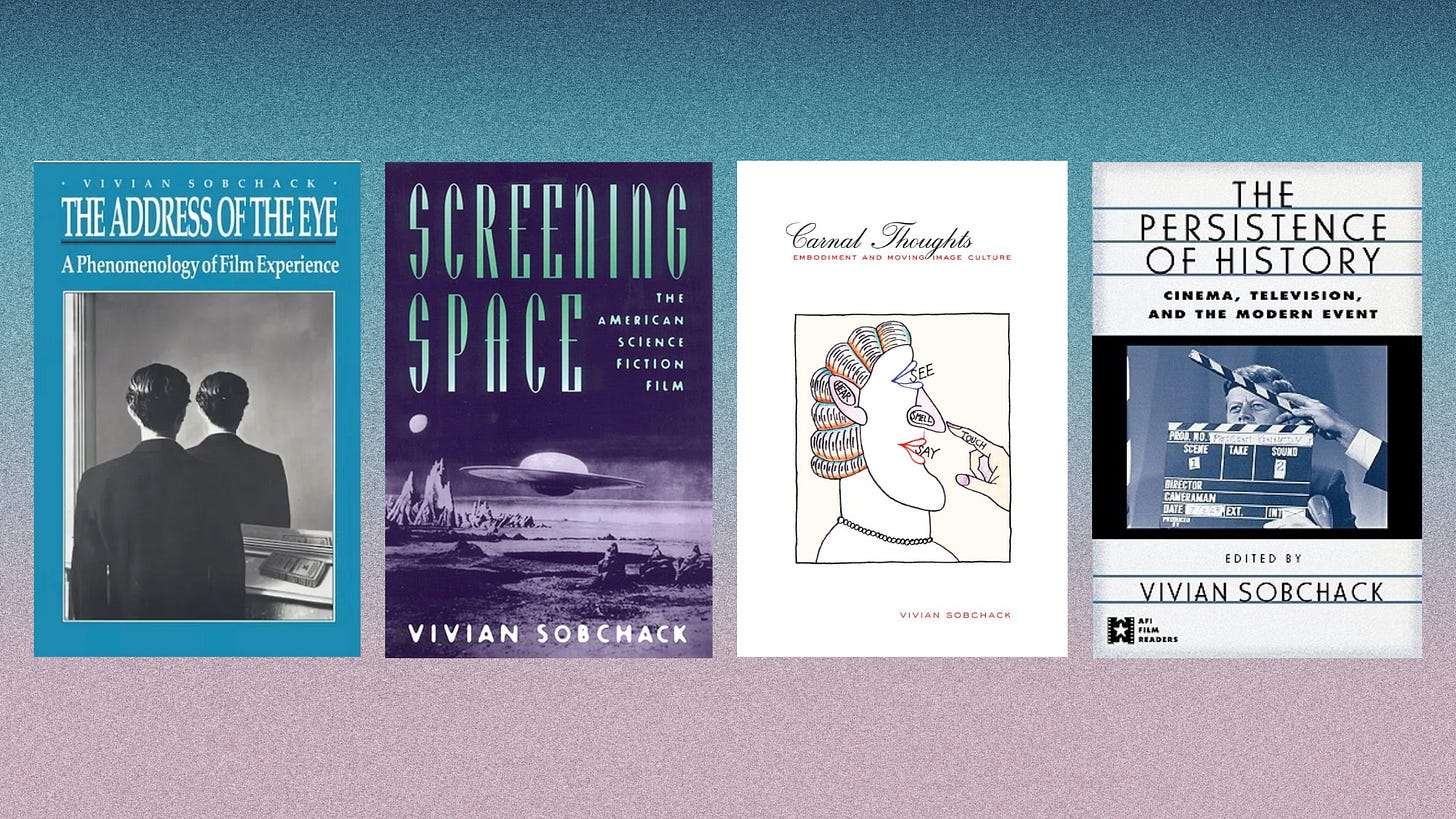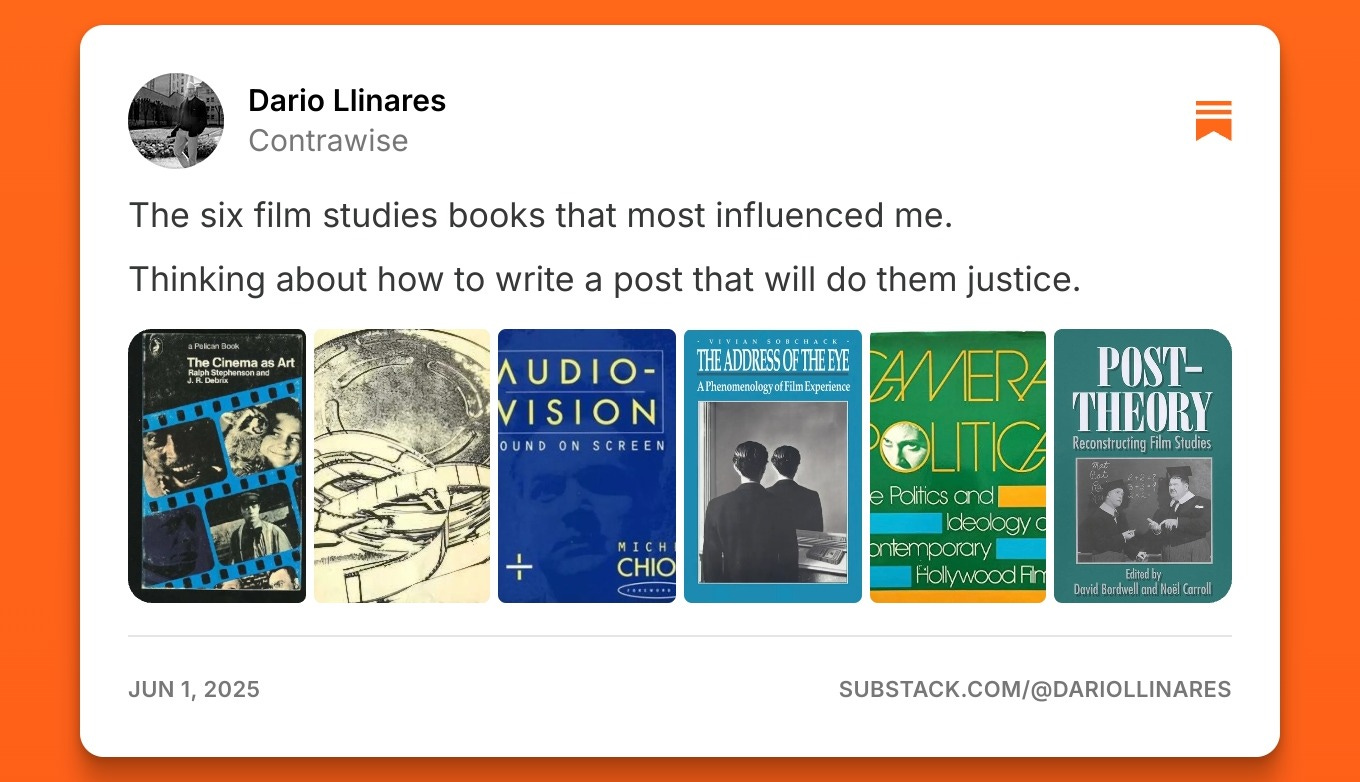On Monday, I posted a single image to Substack Notes: six film studies books that shaped my thinking. Just a quick glance into the academic DNA of my relationship to cinema. I expected polite interest, maybe a couple of comments. Instead, it mildy viral. Over 750 likes, 60 restacks, and a plethora of new subscribers (hello, and thank you).
It’s hard not to read into the metrics. What makes a piece of content resonate, especially one that feels random, even blatantly esoteric? It’s a question I explored recently with Sara Cemin in our Cinema Body/Cinema Mind conversation, when she had a Note go viral. If anything, it’s left me even less certain about how the Notes determines value. The whole process seems governed by a kind of algorithmic whim.
The success of that post reinforces something I’ve long suspected: in a cultural moment increasingly shaped by AI-generated synthesis and automated content, recommendations from real humans - those who’ve done the long reading and lived inside the texture of a field - still carry weight. There’s something quietly reassuring about being pointed, with intention and reasoning, toward a text that someone deems formative and vital.
So in response starting next week, I’ll be put out a Monday “Note” in a seminar format, recommending film studies books - some foundational, some contemporary, in different areas of the discipline. For this post though, I saw an opportunity to go back to one of the books in that viral post: Vivian Sobchack’s The Address of the Eye. And more importantly, to the voice behind it.
Last year, I had the honour of speaking with Prof. Sobchack for The Cinematologists Podcast. Our conversation stretched over two hours are was a winding journey, personal and intellectual, in the company of a scholar who was there at the birth of a field.
The podcast available to free subscribers is 45-minute edit of that interview followed myself and Co-host Neil reflecting on the interview and Prof. Sobchack’s immense contribution to film studies.
For paid subscribers below, the full 2 hour 20 min recording is available.
This conversation remains one of the most enriching exchanges I’ve ever had behind the mic.
On Reading Sobchack
I first encountered The Address of the Eye as an undergraduate. But like so many aspects of my formative university experience, it lingered more as an impression than a fully formed understanding. It wasn’t until around 2012, amid the shifting sands of the media landscape (when phones had seemingly overnight become default extensions of our cognitive and embodied experience), that I returned to it.

I was trying to make sense of what was happening to cinematic attention - how viewing had become fractured, distracted, ambient. Sobchack’s work, with its grounding in Merleau-Ponty and the phenomenological tradition, gave me a framework to think.
But the writing and argument also reinvented my fundamental sense of what cinema engagement is. I became more attuned to the intrinsic way the material conditions of watching - that is being in a body, and that body being in spatial conditions - asserts itself in mechanics of spectatorship.
Sobchack doesn’t just write about film as though observed and interpreted - she writes about experience in and through cinema. The fact that film is not just seen but felt, inhabited and embodied. She does not view cinema as a closed text but as a situation - a relational moment between film and viewer, image and body, technology and memory.
Every since reading The Address of the Eye and then Screening Space and Carnal Thoughts, I've been profoundly influence by her philosophy of film experience.
Indeed, it is the philosophical underpinning to this Substack.
I’ve written about the altered phenomenology of film spectatorship in the digital age, particularly how shifts in media technology have reshaped the sensory and affective dimensions of viewing. My article A Cinema for the Ears, which explores the potential of audio-cinematic podcasting, was directly influenced by Sobchack’s seminal essay When the Ear Dreams: Dolby Digital and the Imagination of Sound. Her work in this piece illuminated how sound technologies are not merely technical enhancements but extensions of the cinematic imagination itself - capable of evoking dreamlike spatialities and tactile resonances.
Equally vital is her essay Sci-Why?: On the Decline of a Film Genre in an Age of Technological Wizardry, which I return to often. It should be required reading for anyone thinking seriously about science fiction cinema today. In it, Sobchack diagnoses the genre’s decline as both an industrial and ideological shift: a symptom of CGI-driven spectacle and a reflection of our deepening social disillusionment. The genre’s once-speculative spirit, she argues, has been diminished by disaster-driven narratives and a cultural moment in which science no longer offers rational coherence but instead mirrors our anxieties and sense of systemic failure.
So, as you can imagine, as a film podcaster, she was always someone who I wanted to bring onto the show. And I very grateful that she accepted my invitation.
A Voice in the Room
In the expansive interview we spoke about the emergence of film studies as a discipline, her early experiences as a young woman in a male-dominated academic space, and how phenomenology gave her a way to resist the purely semiotic or ideological approaches that dominated at the time. Pro. Sobchack speaks candidly, with an irrepressible sharpness, about her intellectual journey, the flaws and beauty of genre cinema (especially science fiction), and the persistent reduction of cinema to "content" in the streaming era.
She also critiques the techno-fetishism of contemporary media environments, where CGI has outpaced not just realism but imagination. In her piece “Sci-Why?”, she notes how science fiction has drifted from its speculative potential into spectacle-driven abstraction - a trend that reflects, and possibly numbs us to, the disorientation of our actual present.
If the episode has a central theme, it is Vivian's groundbreaking legacy in film phenomenology. She contextualises her work within a broader framework, contrasting it with Marxist and psychoanalytic film criticism, and highlights the distinct contributions phenomenology offers to the study of cinema.
There’s something deeply clarifying in her tone: not nostalgic, not despairing, but insistently curious and critical. To hear her speak is to be reminded that serious intellectual work is not the enemy of affect, but its interpreter. And she doesn’t suffer fools.
Cinema That Feels
Sobchack’s body of work isn’t just an academic project, it’s an orientation to cinema that many of us, consciously or not, carry with us: the understanding that watching a film is not a detached act, but a situated, affective, moral, and aesthetic encounter. In a moment when both cinephilia and scholarship feels increasingly fragmented, undervalued and even archaic, this interview acted as something of a reorientation.
A return to that enduring question film lovers keep asking, in one form or another: what is cinema? As Neil and I reflect in the outro, we came away from the conversation renewed in our commitment to think with cinema, not merely about it.
To be honest, I could write a lot more but I want to let the conversation speak for itself. For longtime followers of The Cinematologists, this is one of our in the weeds episodes. For those of you here on Substack, especially those wondering where to begin in understanding what it means to study film in a way that takes the materiality of the human subject as central, this is a perfect place to start.
You can listen above of course, but here is a link to the original cinematologists podcast on Spotify:
And if you want to share your reflections, I’d love to hear them in the comments. This is a space to think collectively, curious, and sensorially.
Thanks for coming back to Cinema Body/Cinema Mind. If you liked what you have read/watched/listened to, I’d really appreciate if you can restack/share to your networks.
A gesture of human curatorial practice is more valuable than any algorithm recommendation.
If you’re not already a subscriber, please consider doing so by hitting the button below. Become part of the network of curious, fascinating people!!
A paid subscription is £3.50 per month and you will get access to the full articles and podcasts I produce. There is a lot of work that goes into the writing and podcasting, so becoming a paying subscriber really help support the continuation of the work.
I’ll also send you and physical postcard, wherever you may reside. How can one resist:
If you don’t want to subscribe but could see your way offering a small tip the labour of producing the work, hit the button below.
The full extended (2 hours 20minutes) version of my conversation with Prof. Sobchack is available for paying subscribers below
Listen to this episode with a 7-day free trial
Subscribe to Cinema Body/Cinema Mind to listen to this post and get 7 days of free access to the full post archives.












